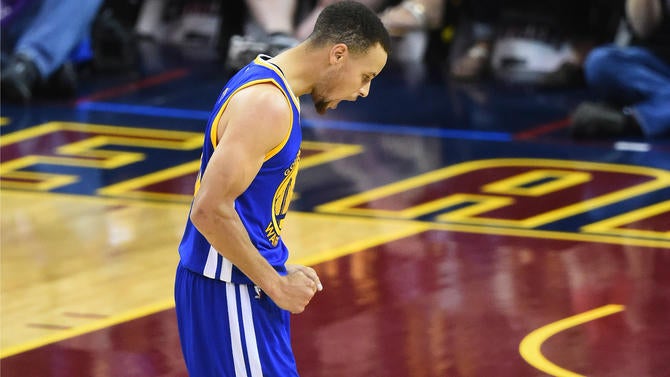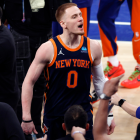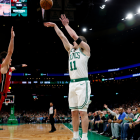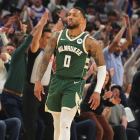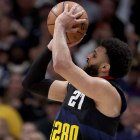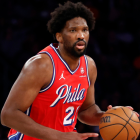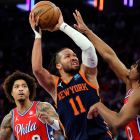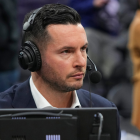The Golden State Warriors are one win away from their second consecutive NBA title. On the strength of a dominant second half, they beat the Cleveland Cavaliers 108-97 in Game 4 at Quicken Loans Arena. Stephen Curry and Klay Thompson combined to score 63 points on 39 field goal attempts, and the Warriors outscored the Cavaliers 58-42 in the second half.
Here are the major takeaways from Game 4:
1. Steph bounced back
The MVP's "struggles" in the NBA Finals were overblown considering Curry only played 25 minutes in the Game 2 blowout and Cleveland's defensive strategy has been to pressure him absolutely everywhere he goes, often to the detriment of its overall team defense. He was sloppy with the ball and his defensive rotations in Game 3, though, and he told reporters he needed to be much better. Two days later, he was.
Curry was patient despite the pressure, and he thrived as both a playmaker and a scorer. This was what the world wanted to see, and it turned out to be exactly what Golden State needed in a physical game with 18 lead changes. Obviously, the 38 points and seven 3-pointers stand out, but his overall command of the offense was just as impressive. He had just three turnovers and the Warriors had just eight as a team. LeBron James said that he "made us pay every time we made a mistake defensively," and it's worth noting that the Cavs made a fair bit of mistakes defensively.
"I mean, he's the MVP, he makes us go, so we follow," Thompson said. "He was sure with the ball tonight and just made the right decisions and let the game come to him. He played an amazing game. I'm proud of the way he competed and everyone else fed off that."
2. Not so soft anymore
Golden State coach Steve Kerr called his team soft after Wednesday's loss. It responded by playing the type of defense that stifled Cleveland in the first two games in the series, and its toughness and discipline in the second half should be as big a story as the Splash Brothers' offensive exploits. The Warriors forced the Cavs to play isolation basketball and they forced seven second-half turnovers.
"We felt threatened," Kerr said. "I think up 2-0 we came in here and, for whatever reason, we thought, OK, we've got this. And they kicked us in the teeth, obviously. And for whatever reason our team's personality -- and it's been this way for two years -- can't stand prosperity. We start winning and then we let our guard down."
Their guard came back up. From the 10:21 mark to the 3:44 mark of the fourth quarter, Cleveland did not make a field goal. In that span, the Warriors went from trailing by two points to leading by nine. Golden State not only had the more fluid offense, but it had more energy on the glass and it was the first to every loose ball. Which brings us to...
3. Maybe some rest would have helped
After halftime, James and Kyrie Irving had played all 24 minutes and J.R. Smith rested for only five seconds. James only sat for 2:26 in the whole game. It doesn't look like a huge differential in the box score, but Kerr managed to keep Curry and Thompson just under 40 minutes of playing time, and it seemed to help. The way that Golden State plays, opponents have to make multiple decisions on every play, so extended playing time can wear them down mentally as well as physically. That appeared to happen to the Cavs.
"When it's time to win and you're in the NBA Finals, you gotta play as many minutes as you need to," Cleveland coach Tyronn Lue said. "If you gotta play 96 minutes, you gotta play 96 minutes. We're trying to win. We're in the Finals. [James] could have got tired and could have been fatigued, but in the NBA Finals you gotta lay it all on the line. In nine days, you can rest all summer."
It's hard to fault Lue too much here, as the season was essentially on the line and his bench has been awful in this series. Still, this is a reminder there is a flip side when you see a coach throw out a "risky" lineup in a big game: stars are human, and they get tired. Overextending them is risky, too.
Note: James and Irving both completely dismissed the idea that fatigue was a factor. That is just what competitors say.
4. The math problem strikes again
Basketball is a complex game, but there are some simple truths in the NBA. One of them is if your opponent outscores you 51-18 from the 3-point line, it will be tough to win. Curry alone made more 3-pointers than the Cavaliers, who went 6-for-25 from long range, and the Warriors broke the NBA Finals record for 3s made, going 17-for-36 as a team. This is despite Draymond Green, Game 2's long-range hero, missing all four of his 3-point attempts.
Again, the credit must go to Golden State's defense. Cleveland got to the Finals by raining 3-pointers on the Eastern Conference, and the Warriors not allowed that to happen. The Cavs can't get many open looks, so when they do, they tend to rush them. The lineup that did the most damage earlier in the playoffs -- Matthew Dellavedova, Iman Shumpert, Richard Jefferson, James and Channing Frye -- can't even get on the floor. If Cleveland can't figure out a way to move the ball and create 3-pointers in rhythm, this series could be over quickly.
5. The Kyrie plan is working
You might look at Irving's team-high 34 points and think that Golden State made some sort of mistake against him. That would be missing the point.
Irving needed 28 shots to get those points, and James was limited to 25 points on 21 shots, plus seven turnovers. None of Cleveland's role players got going and Smith didn't even shoot in the second half. Irving is skilled enough to get a shot off against anybody, and the Warriors are daring him to do that against their set defense. Aside from the first quarter of Game 3, Irving's scoring has not really hurt them.
Sometimes you might watch Golden State and wish it would call more simple isolation and pick-and-roll plays involving Curry. Even though that would be effective, that's not the DNA of the team. The Cavs represent the other side of this -- when things get tough, they fall back into hero ball. Irving is the biggest culprit, and it was a major problem for Cleveland down the stretch.
6. Kerr's experimentation pays off
Anderson Varejao, maligned for most of his tenure with the Warriors, gave his team three offensive rebounds in his four minutes of playing time. Golden State outscored Cleveland by three points in the seven minutes that James Michael McAdoo played. Few coaches would have called on either of them in a pivotal game like this, but Kerr's "strength in numbers" quote ended up being a part of the story yet again.
"They came in, and it may not seem like much, but just a handful of minutes where you're scrapping and clawing, that was important," Kerr said.
Kerr should also get credit for how he handled Andrew Bogut, who has a reduced role for a second straight year in an NBA Finals series that has gone small. Bogut played just 10 minutes, but Kerr stuck with him to start the second half and he gave the Warriors an energy boost. Bogut didn't take a single shot in this game, but his teammates surely appreciated his screening and his physicality.
Game 5 is Monday at 9 p.m. ET.
